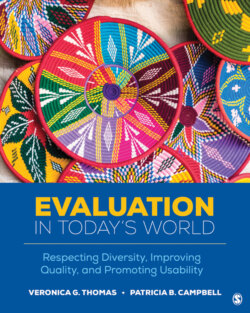Читать книгу Evaluation in Today’s World - Veronica G. Thomas - Страница 16
На сайте Литреса книга снята с продажи.
An Overview of Evaluation
ОглавлениеThe Oxford University Press defines evaluation as “the making of a judgment about the amount, number, or value of something” (Lexico.com, 2020, para. 1). As the definition implies, evaluation is an everyday activity. All of us, either consciously or unconsciously, at some point in time consider the value of a thing; take account of the actions we, or others, have taken; and examine the progress (or lack thereof) we have made on the path we are traveling. Individuals evaluate products and prices at a store to determine whether they will buy a product or even continue to patronize that business. People evaluate their relationships, finances, goals, and health to determine where they are and how they can get better in these areas. By engaging in some form of evaluation, individuals try to assess what is good or bad, what option is better or worse, and what conditions are best to nurture and produce the desired outcomes.
Although people make evaluation decisions, this doesn’t necessarily make them evaluators. Evaluators are professionals who ask and answer questions regarding projects, policies, and programs through the collection and analysis of data. Evaluators seek to provide information that improves decision making at a variety of levels—funders, policymakers, staff, and actual as well as potential participants. Table 1.1 provides a broad overview of the evaluation process from planning to implementation to reporting and use of results.
Table 1.1
